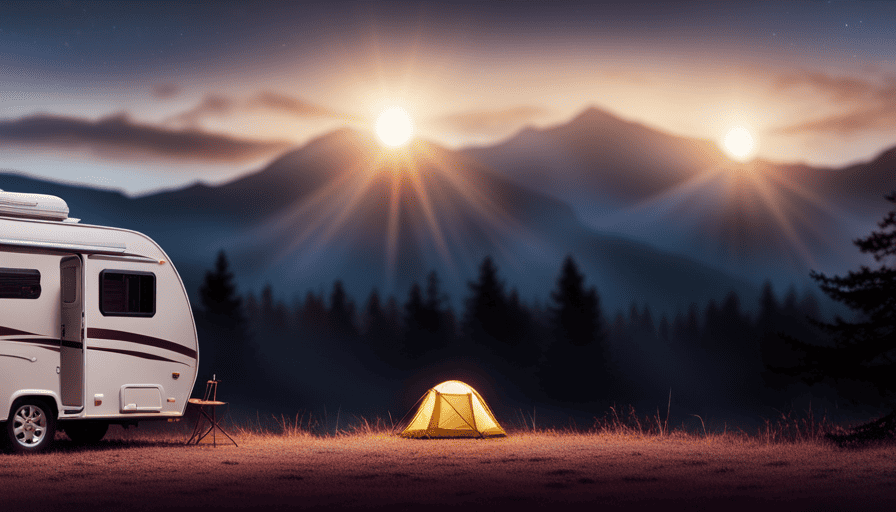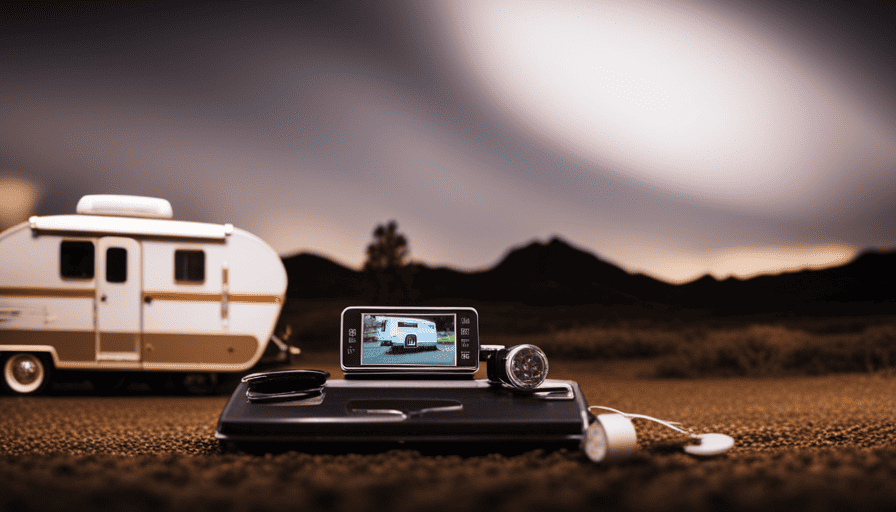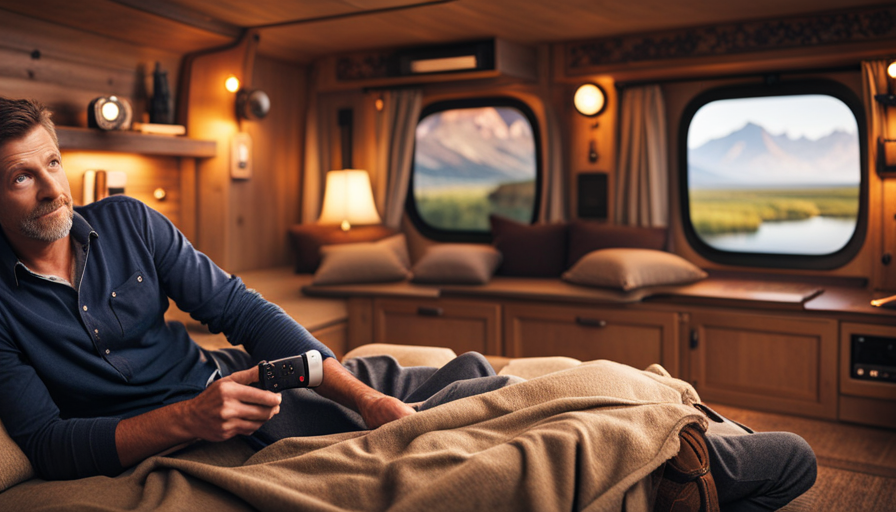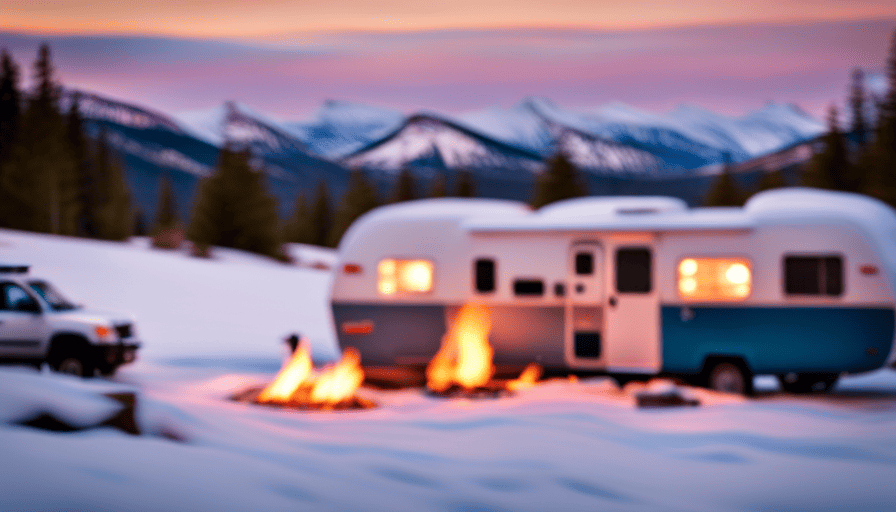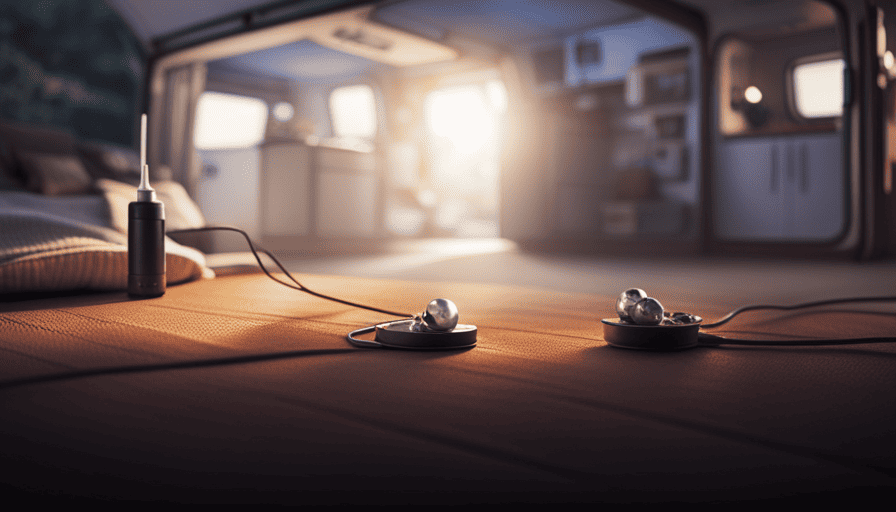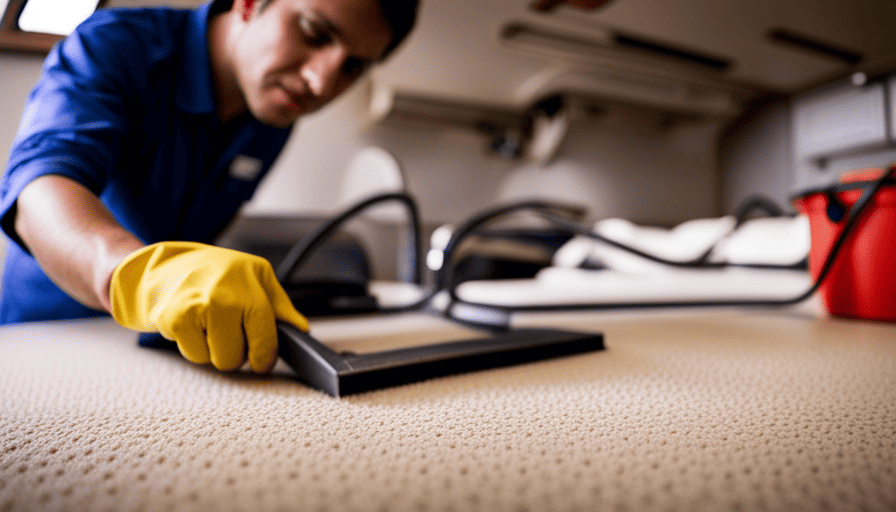Envision setting off on a scenic drive, with the liberty to discover the vast expanse of nature and firsthand experience its marvels. Now, visualize being in a snug camper, enveloped by all the homey comforts.
But here’s the catch – to power all your appliances and devices, you need the right generator. So, how big of a generator do you need to run a camper? The size of the generator you need for your camper depends on the power requirements of your appliances and devices. Before selecting a generator, make a list of all the items you’ll be using and their power consumption. Once you have this information, you can determine the wattage needed for your generator to accommodate your needs. Additionally, consider how to plug camper into the generator and ensure that you have the appropriate cables and connectors for a safe and efficient power source.
In this article, I will guide you through the process of determining the perfect generator size for your camper. We will delve into the technical aspects, considering factors such as power requirements, generator type, fuel efficiency, and noise levels. Additionally, we will explore the importance of size, weight, and additional features.
By the end of this article, armed with expert advice and insights, you will be equipped to make an informed decision that suits your camper and budget. So, let’s dive into the world of generators and ensure your camper journey is powered to perfection.
Key Takeaways
- Factors to consider when determining the perfect generator size for a camper: power requirements, generator type, fuel efficiency, and noise levels.
- Calculate power consumption by adding up wattage ratings of appliances.
- Choose a generator with enough wattage to handle peak power demands.
- Consider voltage requirements (120-volt or 240-volt) of the camper.
Calculate Your Power Requirements
To figure out what size generator you’ll need for your camper, you gotta calculate your power requirements. This involves determining the power consumption of all the appliances and devices you plan to use while camping.
Start by making a list of everything that will be powered by the generator, including lights, refrigerator, air conditioner, microwave, and any other electrical equipment. Look for the wattage rating on each item, which indicates the amount of power it consumes. Add up all the wattage ratings to get the total power consumption.
Next, consider the voltage requirements of your camper. Most campers operate on a 120-volt system, but some may require 240 volts. Make sure you know the voltage requirements before selecting a generator.
Once you have the total power consumption and voltage requirements, you can determine the size of the generator you need. It’s important to choose a generator with enough wattage to handle the peak power demands of your camper. This ensures that all your appliances and devices will operate smoothly without overloading the generator.
Now that you’ve calculated your power requirements, it’s time to consider the type of generator that will best suit your needs.
Consider the Type of Generator
When it comes to choosing a generator for your camper, there are three main types to consider: portable generators, inverter generators, and standby generators.
Portable generators are a popular choice because they’re lightweight and easy to transport, making them perfect for camping trips.
Inverter generators are known for their quiet operation and clean power output, making them ideal for powering sensitive electronics.
Lastly, standby generators are designed to automatically kick in during a power outage and can provide a reliable source of power for your camper.
Portable generators
If you’re looking to power a camper, you’ll need to know the size of the portable generator you require. Portable generators are a popular choice for campers due to their convenience and ease of use. However, it’s important to properly maintain your portable generator to ensure it operates efficiently and safely.
Regular maintenance, such as checking the oil levels, cleaning the air filter, and inspecting the spark plug, is crucial for optimal performance. Additionally, following generator safety tips, such as keeping it outdoors in a well-ventilated area and using a carbon monoxide detector, is essential to prevent accidents.
Now, let’s transition into the next section about inverter generators, which offer some unique advantages for campers.
Inverter generators
Get ready to experience the unbeatable convenience and peace of mind that comes with using an inverter generator for your camping adventures. Inverter generators are a popular choice for campers due to their quiet operation and fuel efficiency.
Unlike traditional generators, inverter generators use advanced technology to produce clean and stable power, making them perfect for powering sensitive electronics like smartphones, laptops, and TVs. One of the key benefits of inverter generators is their low noise level. They’re designed to operate quietly, allowing you to enjoy the tranquility of the great outdoors without any disturbances.
Additionally, inverter generators are known for their fuel efficiency, meaning you can enjoy longer run times without constantly refueling.
Now let’s move on to the next section about standby generators, which offer a different set of advantages.
Standby generators
Standby generators provide a reliable backup power source, ensuring peace of mind during unexpected power outages. These generators are permanently installed outside the camper and are connected to the electrical system.
One important factor to consider when choosing a standby generator is fuel consumption. It’s crucial to select a generator that is fuel-efficient and can run for an extended period without needing constant refueling.
Additionally, noise levels should be taken into account, as loud generators can be disruptive and annoying, especially if you’re camping in a quiet area. Comparing the noise levels of different standby generators will help you choose one that operates quietly.
Assessing fuel efficiency is the next step in determining the right generator size for your camper.
Assess Fuel Efficiency
To optimize your camping experience, you’ll love how fuel-efficient your generator needs to be for running your camper. Fuel consumption is an important factor to consider when choosing a generator for your camper. A fuel-efficient generator will not only save you money on fuel costs but also have a lower environmental impact.
It is essential to assess the fuel consumption of different generator models before making a decision. When evaluating the fuel efficiency of a generator, look for information on the fuel consumption rate. This rate is typically measured in gallons per hour (GPH) or liters per hour (LPH). The lower the fuel consumption rate, the more fuel-efficient the generator is. By choosing a generator with a lower fuel consumption rate, you can extend your camping trips without worrying about running out of fuel.
Additionally, consider the environmental impact of the generator’s fuel consumption. Opt for generators that use cleaner-burning fuels, such as propane or natural gas, as they produce fewer emissions compared to diesel or gasoline-powered generators. This not only helps protect the environment but also ensures a more enjoyable camping experience with fresh air.
Now that you understand the importance of fuel efficiency, it’s time to evaluate noise levels to further enhance your camping adventure.
Evaluate Noise Levels
Immerse yourself in the tranquility of nature by choosing a generator that operates with minimal noise levels, enhancing your camping experience like never before. When evaluating noise levels, it’s crucial to consider the decibel rating of different generators. A lower decibel rating indicates a quieter operation, allowing you to enjoy the peacefulness of your surroundings without any disturbances.
To evaluate fuel consumption and compare noise levels, it’s essential to research and read product specifications and customer reviews. Look for generators that are designed with noise-reducing features such as insulated casings, soundproofing materials, and advanced muffler systems. These features help minimize noise emissions, ensuring a more serene environment.
Comparing noise levels can also involve physically testing different generators. Visit local dealers or rental companies to observe generators in operation and assess their noise levels firsthand. This hands-on approach allows you to experience the noise produced by each generator and make a more informed decision.
By evaluating fuel consumption and comparing noise levels, you can select a generator that not only meets your power needs but also operates quietly, enhancing your camping experience.
In the subsequent section, we’ll explore how to determine the size and weight of a generator, further aiding you in making the right choice for your camper.
Determine the Size and Weight
When determining the size and weight of a generator for my camper, I need to consider portability and storage. It’s important to choose a generator that can easily be transported and stored in my camper without taking up too much space. Additionally, I must assess the weight of the generator to ensure it’s manageable for me to lift and move when needed.
Lastly, I need to make sure that the dimensions of the generator allow it to fit inside my camper without any issues. By considering these factors, I can find a generator that meets my needs for both power and convenience.
Consider portability and storage
Consider the size of generator that would suit your needs while still being easily portable and storable, allowing you to power your camper wherever you go, right? When it comes to portability benefits, you want a generator that is compact and lightweight, making it easy to transport and maneuver. Look for features like built-in handles or wheels for added convenience.
In terms of storage solutions, consider generators that can be easily folded or stacked to minimize the space they take up. Additionally, generators with detachable parts or collapsible handles can make storage even more efficient. By choosing a generator that is both portable and easy to store, you can ensure that it seamlessly fits into your camper lifestyle.
Now, let’s assess the weight of the generator and its impact on your camper’s performance.
Assess the weight of the generator
Don’t let the weight of your power source hold you back from exploring every corner of the great outdoors – instead, find a portable generator that packs a punch without weighing you down.
When assessing the weight of a generator for your camper, it’s important to consider both fuel consumption and noise levels. Look for a generator that is fuel-efficient, as this will ensure longer run times without the need for frequent refueling.
Additionally, comparing noise levels is crucial for a peaceful camping experience. Opt for a generator that operates quietly, so you can enjoy the tranquility of nature without any disruptive sounds.
By finding a generator that meets these criteria, you can ensure it fits in your camper seamlessly, allowing you to power all your essential appliances while minimizing the impact on your overall weight capacity.
Ensure it fits in your camper
Finding a compact and lightweight generator for my camper is an absolute breeze. When considering the size of the generator, it’s important to ensure that it fits within the limited space of the camper. Portable generators are ideal for campers as they can be easily moved around and stored when not in use.
Additionally, they’re typically smaller and lighter compared to permanent installation generators. Another important aspect to consider is power source compatibility. Ensure that the generator you choose is compatible with the power requirements of your camper, whether it’s for running appliances or charging batteries.
It’s always a good idea to consult the manufacturer recommendations for the specific generator model and camper to ensure the perfect fit. This will help guarantee smooth operation and avoid any potential issues.
Consult Manufacturer Recommendations
When determining the size and weight of a generator needed to run a camper, it’s important to consult the manufacturer’s recommendations. The camper’s manual will provide valuable information about the power requirements and generator compatibility.
Additionally, researching specific generator models can help ensure that the chosen generator is suitable for the camper’s needs. If any doubts or questions arise, seeking expert advice from professionals in the field can provide further guidance and clarity in selecting the appropriate generator.
Check the camper’s manual
To truly understand the power requirements for your camper, it’s essential to consult the manual. The camper’s manual will provide detailed information on the power consumption of various appliances and systems. Here are three steps to calculate power consumption and compare generator options:
-
Identify all the appliances and systems in your camper that require power, such as the air conditioner, refrigerator, lighting, and water pump.
-
Note down the power ratings (in watts) for each appliance or system. This information can usually be found on the appliance itself or in the manual.
-
Add up the power ratings to determine the total power consumption of your camper. This will help you determine the minimum generator size required.
By following these steps, you can accurately calculate your camper’s power needs and compare them to different generator options.
Now, let’s move on to researching specific generator models.
Research specific generator models
Researching specific generator models allows me to explore various options tailored to meet my camper’s power requirements. It is crucial to research the reliability of different generator models before making a purchase. By reading customer reviews and checking the reputation of the manufacturer, I can ensure that the generator I choose will be dependable and long-lasting.
Additionally, comparing prices among different models is essential to find the best deal without compromising on quality. I can look for discounts, promotions, or even consider buying a used generator to save some money. However, it’s important to seek expert advice if needed to make an informed decision. This can ensure that I choose a generator that not only meets my camper’s power needs but also fits within my budget.
Seek expert advice if needed
If necessary, it’s advisable to consult with experts for guidance on selecting the most suitable generator model for my camper’s power requirements. Expert advice is crucial in ensuring that the generator I choose can meet the specific power needs of my camper.
They can consider factors such as the appliances I plan to use, the duration of my trips, and any additional power requirements I may have. By seeking expert advice, I can avoid purchasing a generator that’s either too small, which may result in insufficient power supply, or too big, which may be unnecessary and costly.
Once I’ve determined the power requirements of my camper, I can move on to considering additional features that may enhance the generator’s functionality and convenience.
Consider Additional Features
When it comes to powering your camper, don’t overlook the added perks. Consider additional features that can enhance your camping experience while ensuring your power requirements are met.
Here are three key features to keep in mind:
-
Electric Start: An electric start feature allows for easy and convenient operation. With just the push of a button, you can start your generator without the hassle of manual pulling. This is especially beneficial if you have mobility issues or simply want a hassle-free camping experience.
-
Fuel Efficiency: Look for a generator that offers fuel efficiency, as this can save you money in the long run. A generator with a fuel-efficient engine will require less fuel to run, allowing you to enjoy longer camping trips without constantly refueling.
-
Noise Level: Camping is all about enjoying nature and peaceful surroundings. Choose a generator that operates quietly, so you can avoid disturbing your fellow campers or wildlife. Look for generators with noise reduction technology, such as soundproof casings or mufflers, to ensure a quieter camping experience.
Considering these additional features can greatly enhance your camping experience while meeting your power requirements.
Now, let’s transition to the next section where we’ll discuss budget considerations for selecting the right generator.
Budget Considerations
As you’re exploring your options, keep in mind the financial aspect of choosing the right generator for your camping adventures. The cost of a camper generator can vary depending on its size, power output, and additional features. It’s important to consider your budget and determine how much you’re willing to spend on a generator.
When it comes to budget-friendly generator options, there are a few things to consider. Firstly, you can opt for a smaller generator that meets the basic power requirements of your camper. This can help reduce the cost as smaller generators are generally less expensive.
Additionally, consider looking for generators that are on sale or discounted, as they can provide a cost-effective solution. Another option to save money is to choose a generator that runs on a fuel type that is more affordable, such as propane or diesel. These fuels are often cheaper than gasoline and can help you cut down on operating costs.
When considering the cost of a camper generator, it’s important to take into account your budget and explore budget-friendly options. By opting for a smaller generator or one that runs on a more affordable fuel type, you can save money without compromising on functionality. To further aid in your decision-making process, it’s also beneficial to read customer reviews for insights on the performance and reliability of different generator models.
Read Customer Reviews
After considering budgetary constraints, it’s important to gather more information before making a decision on which generator to purchase for your camper. One valuable resource that can provide insight into the performance and reliability of different models is customer reviews.
By reading about other people’s experiences, you can gauge customer satisfaction and identify common issues. This will help you make an informed decision and choose the right generator for your camper.
To help you navigate through the vast amount of information available, here are four key points to consider when reading customer reviews:
-
Performance: Look for reviews that highlight the generator’s ability to power essential appliances in a camper, such as air conditioners, refrigerators, and microwaves.
-
Reliability: Pay attention to feedback on the generator’s durability and longevity. A reliable generator should be able to withstand frequent use and various weather conditions.
-
Noise Level: Consider reviews that discuss the noise produced by the generator. This is particularly important if you plan on camping in quiet or noise-restricted areas.
-
Ease of Use: Evaluate customer comments on the generator’s ease of setup, maintenance, and portability. A user-friendly generator can save you time and effort during your camping trips.
By analyzing customer reviews with these factors in mind, you can gather valuable insights to help you make an informed decision on the right generator for your camper.
Now, let’s explore how to make an informed decision by considering important factors such as power requirements and fuel efficiency.
Make an Informed Decision
To make an informed decision, consider factors such as power requirements and fuel efficiency, which will help you choose the best generator for your camper.
When it comes to power requirements, you need to determine how much power your camper appliances and devices will consume. This can be done by checking the wattage ratings of each item and adding them up. It’s important to choose a generator that can handle the total power load of your camper without overloading.
Fuel efficiency is another crucial factor to consider. A generator with good fuel efficiency won’t only save you money on fuel costs, but also provide longer run times. Look for generators that are equipped with advanced fuel-saving technologies like automatic idle control and inverter technology. These features allow the generator to adjust its engine speed based on the power demand, resulting in reduced fuel consumption.
Additionally, consider the size and weight of the generator. A compact and lightweight generator is ideal for campers as it’ll be easier to transport and store. However, make sure that the generator is still capable of providing enough power for your camper’s needs.
By carefully considering the power requirements and fuel efficiency of different generators, you can make an informed decision and choose the best generator for your camper.
Frequently Asked Questions
How do I calculate the power requirements for my camper?
Calculating power requirements for a camper involves determining the electrical load of all appliances and devices you plan to use. To size a generator accordingly, add up the wattage ratings of each item and account for any additional surge requirements. Consider the starting and running wattage of the air conditioner, refrigerator, microwave, and other power-hungry appliances.
By accurately assessing your power needs, you can ensure the generator you choose will provide sufficient electricity for your camper’s operation.
What are the different types of generators available for campers?
There are two main types of generators available for campers: portable and built-in. Portable generators are smaller and can be easily transported, making them convenient for camping trips. They run on gasoline or propane and provide power to run appliances and charge batteries.
On the other hand, built-in generators are permanently installed in the camper and are typically powered by diesel or gasoline.
Another option for powering a camper is using solar panels, which harness energy from the sun to charge batteries and run appliances.
How can I assess the fuel efficiency of a generator?
To assess the fuel efficiency of a generator, I would start by comparing the fuel consumption of different generator models. Look for information on the generator’s fuel consumption rate, typically measured in gallons per hour or liters per hour. This will give you an idea of how much fuel the generator will consume over a specific period.
Additionally, consider factors such as generator size, load capacity, and run time to determine the overall fuel efficiency of each model.
Are there any noise level regulations for generators used in camping?
If you’re camping and want to ensure a peaceful experience, it’s important to consider noise level regulations for generators. Excessive generator noise can disrupt the tranquility of nature and annoy fellow campers.
To avoid this, opt for generators with low noise levels, typically below 60 decibels. Alternatively, consider using solar power for camping. Solar panels are quiet, environmentally friendly, and provide a sustainable power source. Plus, they eliminate the need for a generator altogether.
What are some additional features to consider when choosing a generator for a camper?
When choosing a generator for a camper, it’s important to consider additional features such as battery power and solar panels. Battery power allows you to store and use energy when the generator isn’t running, providing a backup source of power. Solar panels can help charge the battery during the day, reducing reliance on the generator. These features provide increased flexibility and sustainability for powering your camper.
Conclusion
In conclusion, after carefully considering your power requirements, the type of generator, fuel efficiency, noise levels, size and weight, additional features, budget, and customer reviews, you can make an informed decision about the right generator for your camper.
Remember, "don’t judge a book by its cover" – just because a generator may be smaller in size doesn’t mean it won’t pack a powerful punch.
So, choose wisely and let your camper adventure be powered by a generator that exceeds your expectations. Safe travels!

